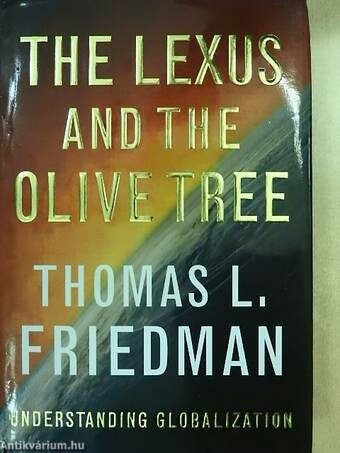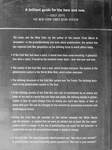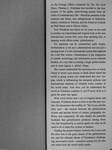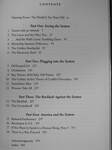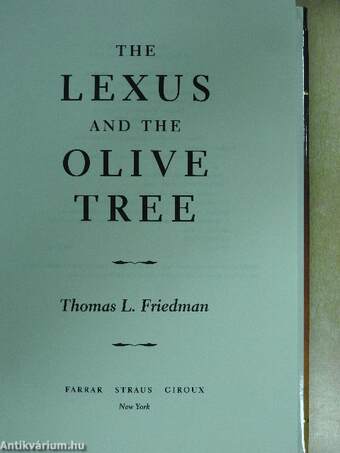1.061.872
kiadvánnyal nyújtjuk Magyarország legnagyobb antikvár könyv-kínálatát

VISSZA
A TETEJÉRE
JAVASLATOKÉszre-
vételek
The Lexus and the Olive Tree
Understanding Globalization
| Kiadó: | Farrar, Straus and Giroux |
|---|---|
| Kiadás helye: | New York |
| Kiadás éve: | |
| Kötés típusa: | Félvászon |
| Oldalszám: | 394 oldal |
| Sorozatcím: | |
| Kötetszám: | |
| Nyelv: | Angol |
| Méret: | 24 cm x 16 cm |
| ISBN: | 0-374-19203-0 |
naponta értesítjük a beérkező friss
kiadványokról
naponta értesítjük a beérkező friss
kiadványokról
Fülszöveg
A brilliant guide for the here and now.
—JOSEF JOFFE THE NEW YORK TIMES BOOK REVIEW
The Lexus and the Olive Tree—by the author of the classic From Beirut to Jerusalem—\s the groundhreaking new book about globalization, the system that has replaced Gold War geopolitics as the defining force in world affairs today.
• If the Coid War had been a sport, it would have been sumo wrestling; if globalization were a sport, it would be the hundred-meter dash—over and over and over.
• The symbol of the Cold War was a wall, which divided everyone. The symbol of the globalization system is the World Wide Web, which unites everyone.
• The defining document of the Cold War system was The Treaty. The defining docu-ment of the globalization system is The Deal.
• If the defining anxiety of the Cold War was fear of annihilation by an enemy you knew all too well in a world that was fixed and stable, the defining anxiety in globalization is fear of rapid change from an enemy you can't see, touch,... Tovább
Fülszöveg
A brilliant guide for the here and now.
—JOSEF JOFFE THE NEW YORK TIMES BOOK REVIEW
The Lexus and the Olive Tree—by the author of the classic From Beirut to Jerusalem—\s the groundhreaking new book about globalization, the system that has replaced Gold War geopolitics as the defining force in world affairs today.
• If the Coid War had been a sport, it would have been sumo wrestling; if globalization were a sport, it would be the hundred-meter dash—over and over and over.
• The symbol of the Cold War was a wall, which divided everyone. The symbol of the globalization system is the World Wide Web, which unites everyone.
• The defining document of the Cold War system was The Treaty. The defining docu-ment of the globalization system is The Deal.
• If the defining anxiety of the Cold War was fear of annihilation by an enemy you knew all too well in a world that was fixed and stable, the defining anxiety in globalization is fear of rapid change from an enemy you can't see, touch, or feel—a sense that your life can be changed at any moment by anonymous economic and technological forces.
• During the Cold War, we reached for the hotline between the White House and the Kremlin—a symbol that we were all divided but at least the two super-powers were in charge. In the era of globalization, we reach for the Internet—a symbol that we are all connected but nobody is totally in charge.
• In the Cold War, the most frequently asked question was "How big is your missile?" In globalization, the most frequently asked question is "How fast is your modem?"
As the Foreign Affairs columnist for The New York Times, Thomas L. Friedman has traveled to the four corners of the globe, interviewing people from all walks of contemporary life—Brazilian peasants in the Amazon rain forest, new entrepreneurs in Indonesia, Islamic students in Teherán, and the financial wizards on Wall Street and in Silicon Valley.
Now Friedman has drawn on his years on the road to produce an engrossing and originál look at the new international system that, more than anything else, is shaping world affairs today: globalization.
His argument can be summarized quite simply. Globalization is not just a phenomenon and not just a passing trend. It is the international system that replaced the Cold War system. Globalization is the integration of capital, technology, and information across national borders, in a way that is creating a single global markét and, to somé degree, a global village.
You cannot understand the morning news or know where to invest your money or think about where the world is going unless you understand this new system, which is influencing the domestic policies and international relations of virtually every country in the world today. And once you do understand the world as Friedman explains it, you'll never look at it quite the same way again.
With vivid stories and a set of originál terms and concepts, Friedman shows us how to see this new system. He dramatizes the conflict of "the Lexus and the olive tree"—the tension between the globalization system and ancient forces of culture, geography, tra-dition, and community. He alsó details the powerful backlash that globalization produces among those who feel brutalized by it, and he spells out what we all need to do to keep this system in balance.
Finding the proper balance between the Lexus and the olive tree is the great drama of the globalization era, and the ultimate theme of Friedman 's challeng-ing, provocative book—essential reading for all who care about how the world really works. Vissza
Témakörök
- Történelem > Társadalomelmélet
- Közgazdaságtan > Gazdaságpolitika
- Közgazdaságtan > Közgazdasági elméletek > Egyéb
- Idegennyelv > Idegennyelvű könyvek > Angol > Közgazdaságtan > Gazdaságpolitika
- Idegennyelv > Idegennyelvű könyvek > Angol > Történelem > Egyéb
- Idegennyelv > Idegennyelvű könyvek > Angol > Közgazdaságtan > Közgazdasági elméletek > Egyéb
- Történelem > Idegennyelvű > Angol
- Történelem > Politika > Külpolitika > Egyéb
- Történelem > Legújabb kor > Globalizálódó világ
- Történelem > Tanulmányok



